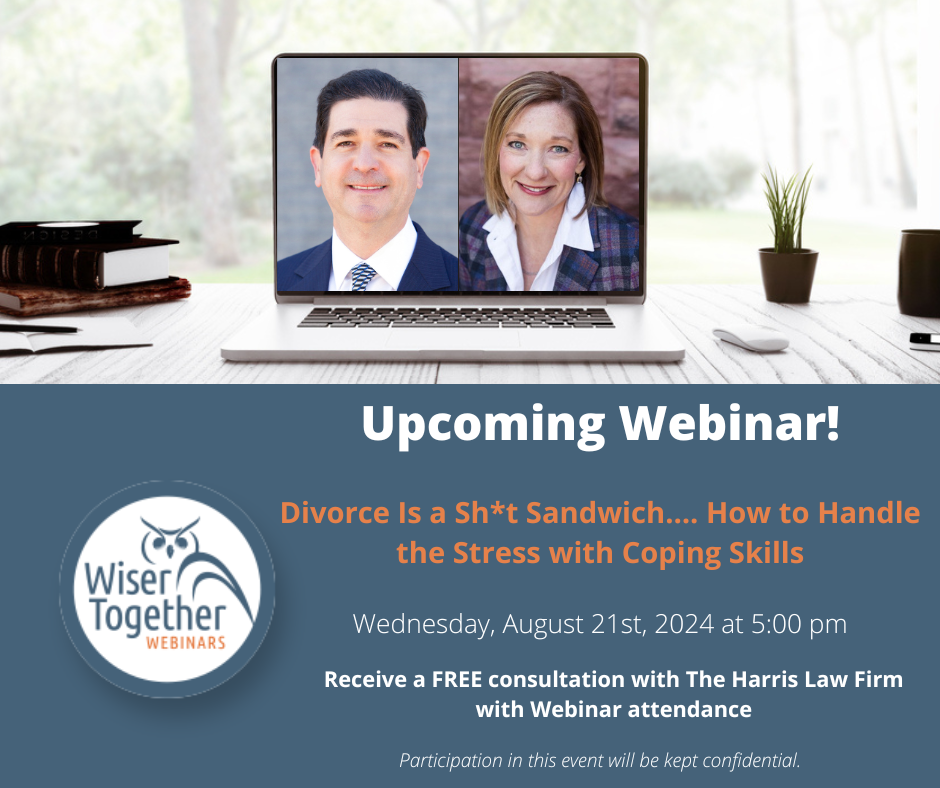Are You Choking on the Sh!t Sandwich of Divorce? Five Coping Strategies to Make it A Bit More Digestible
If you’re anywhere in the divorce process – even in an amicable divorce – you’ve probably experienced periods where you’ve felt stressed and overwhelmed. Wha...

If you’re anywhere in the divorce process – even in an amicable divorce – you’ve probably experienced periods where you’ve felt stressed and overwhelmed. What should you do first? Is this the right decision? Whose advice should you trust? It’s a brutal irony that we need to be at our decision-making best despite feeling our emotional worst.
I’ve been there, too, and through my own experience and by working as a divorce coach with clients through all kinds of challenges, I’ve found the following practical steps make the Sh!t Sandwich of divorce a little more digestible.
I recommend these steps to every client regardless of where they are in the process. As you review, focus on whatever feels most important to you in this moment rather than the order listed here. Every person’s situation is different and what works for you might be totally different than what others do to cope.
- Engage support
Even the most straight forward, low conflict divorce can be stressful and isolating. I recommend people identify at least one personal and one professional to rely on throughout the process. Options include a lawyer, coach, support group, family member, friend or babysitter. Once you’ve identified the right people, choose specific ways they can help. A great way to do this is to sit down and identify your priorities during the process. Examples include: having dinner at home with your kids, exercising every morning, or some dedicated time to yourself before bed. Once you have your priorities, align your asks to meet them. I know how hard it is to ask for support, especially if you’re used to offering, not receiving it. But the people around you want to help and try thinking of how you would feel if you were asked. Chances are you’d be grateful to do something that really does make a difference for someone you care about. Ultimately, these asks can have a positive impact on your life during and beyond the divorce process.
- Self-care
You wouldn’t run a marathon in flip flops, without food or water, and your divorce also requires ongoing fuel and the right support. You might need more sleep than usual, or feel you aren’t up to an intense workout. Maybe walking is plenty! Changing the scenery to get outside and get fresh air is almost always beneficial. How are you letting off steam? I find journaling to be a powerful way to get your thoughts out of your head so you can let them go. If journaling is new for you and you don’t know where to start, try a prompt like one of these:
- Imagine your life tomorrow as if it could be anything.
- Is there an age you would return to in your life? Why that one?
- Write a letter to someone significant in your life. (No need to send it!)
Possibly the most important aspect of self-care is to be kind to yourself during this challenging time. What would you say to your best friend if they were in this situation? No one is perfect and you will make mistakes. It’s how you handle them that matters.
- Engage your strengths
The following exercise is a great way to remind yourself that you are stronger and more capable than you might feel as you navigate this challenging period.
- Identify a time in your life when you overcame a major obstacle. Got it?
- Now ask yourself,
- What attributes did you bring to that situation?
- How did you regenerate your reserves?
- How can you apply those strengths to this situation?
- When you think about how you want your life to be in three to five years, what strengths will people see in you?
- Find your “Best Self”
Choosing to engage the best version of yourself during this process will help you move forward, find optimism, and reduce stress.
Start by identifying the attributes you display when you’re fully alive and engaged.
- I am at my best when…
- Values I demonstrate when I’m at my best include…
- I want to be my best self because…
Write down your answers and keep them with you – on your phone or a sticky note where you can remind yourself often that your choices matter, and you are strong!
- Take the wins
Small wins add up! Acknowledging success will help you build on your accomplishments and repeat them.
- Did you wake up today feeling better than yesterday?
- Did you get something done from your list?
- Did you respond better than you have before in a difficult situation?
- Did you apologize for a mistake?
What else have you tried? What’s worked, and what hasn’t?
Sharing what you’ve learned with others can be another great way to recognize and embrace successes and setbacks. I’d love to hear about your experiences!





.jpg)